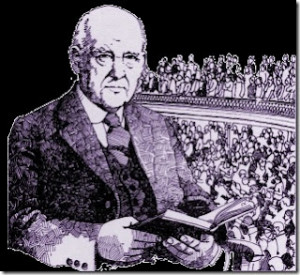 Article: R. C. Sproul (original source here)
Article: R. C. Sproul (original source here)
Does prayer make any difference? Does it really change anything? Someone once asked me that question, only in a slightly different manner: “Does prayer change God’s mind?” My answer brought storms of protest. I said simply, “No.” Now, if the person had asked me, “Does prayer change things?” I would have answered, “Of course!”
The Bible says there are certain things God has decreed from all eternity. Those things will inevitably come to pass. If you were to pray individually or if you and I were to join forces in prayer or if all the Christians of the world were to pray collectively, it “would not change what God, in His hidden counsel, has determined to do. If we decided to pray for Jesus not to return, He still would return. You might ask, though, “Doesn’t the Bible say that if two or three agree on anything, they’ll get it?” Yes, it does, but that passage is talking about church discipline, not prayer requests. So we must take all the biblical teaching on prayer into account and not isolate one passage from the rest. We must approach the matter in light of the whole of Scripture, resisting an atomistic reading. Again, you might ask, “Doesn’t the Bible say from time to time that God repents?” Yes, the Old Testament certainly says so. The book of Jonah tells us that God “repented of ” the judgment He had planned for the people of Nineveh (Jonah 3:10, KJV). In using the concept of repentance here, the Bible is describing God, who is Spirit, in what theologians call “anthropomorphic” language. Obviously the Bible does not mean that God repented in the way we would repent; otherwise, we could rightly assume that God had sinned and therefore would need a savior Himself. What it clearly means is that God removed the threat of judgment from the people. The Hebrew word nacham, translated “repent” in the King James Version, means “comforted” or “eased” in this case. God was comforted and felt at ease that the people “had turned from their sin, and therefore He revoked the sentence of judgment He had imposed.
When God hangs His sword of judgment over people’s heads, and they repent and He then withholds His judgment, has He really changed His mind? The mind of God does not change for God does not change. Things change, and they change according to His sovereign will, which He exercises through secondary means and secondary activities. The prayer of His people is one of the means He uses to bring things to pass in this world. So if you ask me whether prayer changes things, I answer with an unhesitating “Yes!”
It is impossible to know how much of human history reflects God’s immediate intervention and how much reveals God working through human agents. Calvin’s favorite example of this was the book of Job. The Sabeans and the Chaldeans had taken Job’s donkeys and camels. Why? Because Satan had stirred their hearts to do so. But why? Because Satan had received permission from God to test Job’s faithfulness in any way he so desired, short of taking Job’s life. Why had God agreed to such a thing? For three reasons: (1) to silence the slander of Satan; (2) to vindicate Himself; and (3) to vindicate Job from the slander of Satan. All of these reasons are perfectly righteous justifications for God’s actions.
By contrast, Satan’s purpose in stirring up these two groups was to cause Job to blaspheme God—an altogether wicked motive. But we notice that Satan did not do something supernatural to accomplish his ends. He chose human agents—the Sabeans and Chaldeans, who were evil by nature—to steal Job’s animals. The Sabeans and Chaldeans were known for their thievery and murderous way of life. Their will was involved, but there was no coercion; God’s purpose was accomplished through their wicked actions.
The Sabeans and Chaldeans were free to choose, but for them, as for us, freedom always means freedom within limits. We must not, however, confuse human freedom and human autonomy. There will always be a conflict between divine sovereignty and human autonomy. There is never a conflict between divine sovereignty and human freedom. The Bible says that man is free, but he is not an autonomous law unto himself.
Suppose the Sabeans and Chaldeans had prayed, “Lead us not into temptation, but deliver us from the evil one.” I’m absolutely certain that Job’s animals still would have been stolen, but not necessarily by the Sabeans and Chaldeans. God might have chosen to”answer their prayer, but He would have used some other agent to steal Job’s animals. There is freedom within limits, and within those limits, our prayers can change things. The Scriptures tell us that Elijah, through prayer, kept the rain from falling. He was not dissuaded from praying by his understanding of divine sovereignty.
No human being has ever had a more profound understanding of divine sovereignty than Jesus. No man ever prayed more fiercely or more effectively. Even in Gethsemane, He requested an option, a different way. When the request was denied, He bowed to the Father’s will. The very reason we pray is because of God’s sovereignty, because we believe that God has it within His power to order things according to His purpose. That is what sovereignty is all about—ordering things according to God’s purpose. So then, does prayer change God’s mind? No. Does prayer change things? Yes, of course. The promise of the Scriptures is that “The prayer of a righteous person has great power as it is working” (James 5:16). The problem is that we are not all that righteous. What prayer most often changes is the wickedness and the hardness of our own hearts. That alone would be reason enough to pray, even if none of the other reasons were valid or true.
In a sermon titled “The Most High, a Prayer-Hearing God,” Jonathan Edwards gave two reasons why God requires prayer:
With respect to God, prayer is but a sensible acknowledgement of our dependence on him to his glory. As he hath made all things for his own glory, so he will be glorified and acknowledged by his creatures; and it is fit that he should require this of those who would be subjects of his mercy . . . [it] is a suitable acknowledgement of our dependence on the power and mercy of God for that which we need, and but a suitable honor paid to the great Author and Fountain of all good.
With respect to ourselves, God requires prayer of us . . . Fervent prayer many ways tends to prepare the heart. Hereby is excited a sense of our need . . . whereby the mind is more prepared to prize [his mercy] . . . Our prayer to God may excite in us a suitable sense and consideration of our dependence on God for the mercy we ask, and a suitable exercise of faith in God’s sufficiency, so that we may be prepared to glorify his name when the mercy is received.
(The Works of Jonathan Edwards [Carlisle, Pa.: Banner of Truth Trust, 1974], 2:116)
All that God does is for His glory first and for our benefit second. We pray because God commands us to pray, because it glorifies Him, and because it benefits us.






